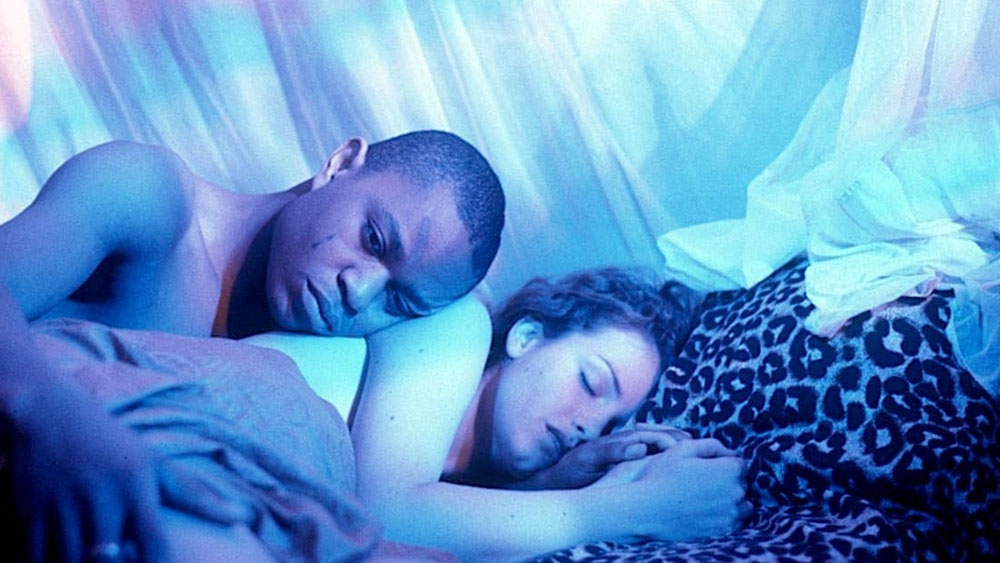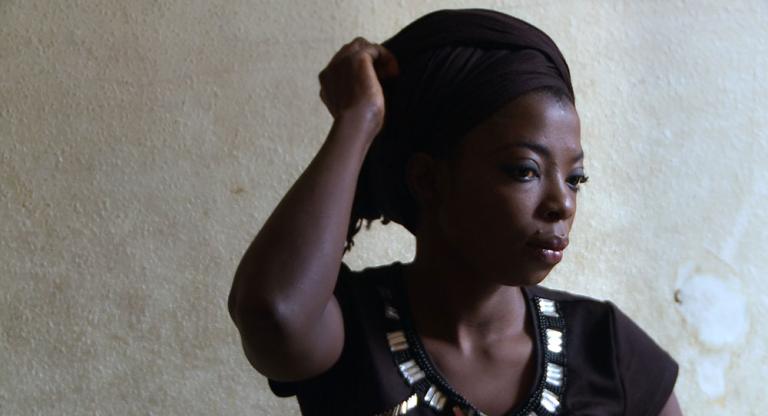Soul Sister (Catherine Coffey) reports “direct from the streets of Transdean,” the futuristic ghetto denizens call the Terrordome: “Them take your taxes—then say they’re gonna fix the ozone layer. But the sun’s gone down, and it’s still gettin’ hot.” Ngozi Onwurah sets her debut feature in this cramped, steamfunk, British dystopia, not so far off from the American realities Public Enemy lyricized in “Welcome to the Terrordome,” the song and music video that inspired the film, including its Malcolm X iconography and killer original soundtrack (much of it produced by the Tottenham-based MC Black Radical MKII, aka Felix Joseph, who also stars). The radio testimonial hints at another influence: Señor Love Daddy (Samuel L. Jackson), the DJ who chronicles sweltering forecasts in Spike Lee’s Do the Right Thing (1989). But Onwurah is more concerned with what that heat means for the earth’s longevity. She haunts her sci-fi city with a dead sun and perpetual night, and builds on her inspirations with lithe and unreplicable style.
Two rival gangs vie for drug supremacy in the Terrordome. To get a leg up, Spike (Valentine Nonyela) suggests selling to white neighborhoods, which we never see in the film—white characters only visit, as cops or informants. “[The police’s] job was to make sure drugs and guns stayed in the ghetto,” Spike explains in voiceover. “And the gray suits in city hall didn’t give a damn what we did, so long as we did it amongst ourselves.” But he holds the key to that untapped market: the only white girl this side of the Terrordome, Jodie (Saffron Burrows), who's pregnant with his child.
Onwurah’s mix of voiceover narration and song, both occasionally taking the place of dialogue, spells out what’s to come. Words bleed through shanty walls—a television wakes a baby one room over, and their cries compete with blaring bad news. Moving through this congested sound space, Onwurah’s characters find room to think only in voiceover and on the soundtrack. Altogether, this sonic skein forms a collective consciousness, a sense of past informing present and future, and of Long Island rap rousing Britain’s underground hip-hop scene.
Upon the film’s release in 1995, critics found Onwurah’s futuristic vision untimely. They felt her gangs’ Malcolm X oriflamme was irrelevant to the ’90s, let alone to projections of the future—that violent revolutionary theory was just an ugly necessity of the past. Derek Elley of Variety wrote, “There’s a curiously old-fashioned feel to its simplistic, idealized stance that vaguely recalls angry early-’70s works like Melvin Van Peebles’ Sweet Sweetback’s Baadasssss Song.” In his Empire magazine review, Steve Beard misgendered Onwurah, the first Black British woman to direct a feature film released in UK theaters: “This rabble-rousing black movie is at least 20 years late, with its dominant themes—pan-African nationalism, black separatism, freedom-through-violence—belonging somewhere in the early 70s…. His debut film seems quite unaware of how black concerns have become far more global in the more peaceable 90s.” Months later, 26-year-old Wayne Douglas died suspiciously in police custody, provoking the 1995 Brixton Riots.
Nearly thirty years later, to announce its availability on the Criterion Channel, a Guardian headline wondered, “Has Terrordome’s time come?” In other words, Welcome II the Terrordome is suddenly “timely,” the new watchword for any film that addresses anti-Blackness, as if white supremacy was born yesterday, or only springs from its burrow when it can’t see its shadow. But like many old films retroactively inscribed as such, Welcome II the Terrordome never failed to be timely. As Public Enemy’s Professor Griff once said, “Armageddon has been in effect. Go get a late pass.”
Welcome II the Terrordome is streaming on the Criterion Channel




